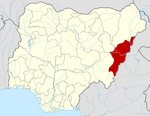Michika
| Michika Mwecika | |
|---|---|
| LGA and town | |
| Nickname(s): The Igbos of Northern Nigeria | |
| Motto: Land of Triple Heritage | |
 Michika | |
| Coordinates: 10°37′N 13°23′E / 10.617°N 13.383°ECoordinates: 10°37′N 13°23′E / 10.617°N 13.383°E | |
| Country |
|
| State | Adamawa State |
| Time zone | WAT (UTC+1) |
Michika (Mwe-cika) is a Local Government Area of Adamawa State, Nigeria.
The principal tribe and language in Michika is the Kamwe. Michika local government was created in 1976. It is located in the northern axis of the state and is bordered on the East by the Republic of Cameroon. Michika is made of eight districts. Michika is the corrupted word for Mwe-ci-ka which is the Kamwe Language for "creeping in silently". Oral history has it that Michika was founded around the late 17th century by Kwada Kwakaa who was a hunter hunting on the Michika hills. "Mwe" in the Kamwe language means heaven or hills. While "Ci-ka" means creep. Kwada Kwakaa was a heroic Kamwe prince from Kuli in Nkafamiya. Legend in Kamwe land believed that Kwada Kwakaa could hunt lions and leopards by himself.
following the death of Coffor Maunde who acted as District Head for over 50 years.[1]
Michika local government is the most populated in Adamawa State. The Kamwe people are generally very enterprising, as they are found in big cities and towns in Nigeria engaging in all forms of lawful trades. The Kamwe people are peaceful and hospitable people.[2]
Michika is a cosmopolitan town. It has branches of many banks, a college of health and technology, a technical college and many secondary schools. The oldest and most popular secondary school in Michika is the Government Senior Secondary School (G.S.S.) Michika. The inhabitants are ninety-seven percent Christians, while the remaining three percent are traditional religion worshipers and Muslims . There are about 26 chiefdoms and 84 villages around the mountainous ranges in Michika local government. Michika town is traversed by a stream called Wathara.
There are many cultural festivals performed by the Kamwe people in Michika. Foremost amongst them are the Yawale, Wasinata and the Ngarba and the zhitta dance among other festivals. There are also tourists sites and scenery in Michika like the Kwandree cold spring water at Dlaka and the Kamale peak at Kamale.
The Kamwe people embraced western education early and hence they have many intellectuals and have the highest number of primary school pupil enrollment in Adamawa State. Michika has produced prominent sons such as Abubakar Saleh Michika, Late Reverend (Dr) John Guli, Damude T. Kwache, Boni Haruna, Mohammed Buba Marwa and Reverend (Dr) Samuel D Dali
The population of Michika is large; estimates have varied from around 375,000 and 700, 000 depending on the census used and its methodology.[3]
There has been a new sensitization by Kamwe youths for the establishment of a University in Michika to be called the Kwada Kwakaa University Michika named after the founder of Michika Kwada Kwakaa.
The town was seized by the Boko Haram Islamic terrorists in September 2014 but the town was re-captured by the Nigerian military on the 29th of January 2015.[4]
President Goodluck Jonathan happily announced re-capture of Michika Town from Boko Haram Islamic terrorists on Thursday the 29th of January 2015. He made the announcement while on campaign tour of Adamawa State. It is a special privilege for Michika and shows the President's concern for the Kamwe Land in particular.[5][6]
Major languages
Kamwe (Higi), Marghi and Hausa
References
- ↑ Leadership Newspaper 2 January 2014
- ↑ The Kamwe Language: The People and the Culture. Iliya Yame Kwache. Unpublished.
- ↑ Kwache, Emmanuel. "Population Census In Nigeria , The Case Of Michika Adamawa State". NgEX! NigeriaExchange News. Retrieved 2014-10-26.
- ↑ "Nigeria's Boko Haram 'seize' Michika in Adamawa state BBC News". BBC. 2014-09-08. Retrieved 2014-10-26.
- ↑ 5
- ↑ Nigerian military says Boko Haram sacked from Michika, but displaced residents skeptical
5.Nigerian military says Boko Haram sacked from Michika.
